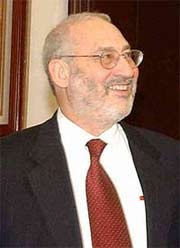UN Panel wants G-20 to discuss new global reserve currency
28 Mar 2009
A United Nations panel has called on the Group of 20 nation to deliberate on fundamental reforms in the global financial system, including the formation of a new global currency reserve, considering the deep and prolonged economic crisis facing the world community.
 ''These reforms will occur and the only question is whether they will occur in a random and ad hoc way or if they will be orderly,'' Joseph Stiglitz, chairman of the commission of experts of the president of the United Nations General Assembly on reforms of the international monetary and financial system, said at the end of a three-day interactive dialogue.
''These reforms will occur and the only question is whether they will occur in a random and ad hoc way or if they will be orderly,'' Joseph Stiglitz, chairman of the commission of experts of the president of the United Nations General Assembly on reforms of the international monetary and financial system, said at the end of a three-day interactive dialogue.
He said the commission believed the more proactive approach of a top-down global strategy was preferable.
The interactive dialogue was intended to help member states arrive at a common position for taking stock of the crisis, evaluating alternative short-term emergency measures and shaping an effective approach for longer-term efforts to restore dynamism, revive employment and enhance equity in the world economy, a release by the world body said.
Deliberations at the interactive centered round a set of draft recommendations made by the ''Stiglitz Commission'', which will provide a final set of prescriptions before the high-level UN conference on the economic crisis scheduled from 1 to 3 June.
Stiglitz said a dichotomy had surfaced in the Assembly's discussions between immediate economic stimulus or a redesign of financial regulatory regimes, adding that it was a false dichotomy as both actions were needed.
''While it was prudent to make use of existing institutions, it was important both to reform them and create new ones,'' he said.
The commission had called for a global economic coordination council at the level of the General Assembly or the Security Council, a global reserve system, a new credit facility to provide developing countries with greater resources, a financial products safety commission, a global financial regulatory authority, a global competition authority and an international bankruptcy court.
The critical difference between the current crisis and past ones, like the Asian crisis when talk of reform had been mere words, was the developed world's position at the epicentre, according to Stiglitz. ''This is not a downturn that happened on the periphery. It began in the centre and has gone to the rest of the world with devastating effects on the periphery.''
''In that way, the crisis had exposed flaws in the global economic system and in globalisation, making a return to the world of the past impossible, he said. It was, therefore, in the interest of every country - rich and poor, debtor and creditor alike - to create the kind of strong institutions the commission had proposed. Indeed, since instability in the international economic structures affected each country, global action would be critical, it noted.
Assembly President Miguel D'Escoto Brockmann said the urgency of the unfolding economic and financial crises was unmistakable and made clear just how critical the reform of the financial infrastructure was.
It was time, he emphasized, for the General Assembly to rise to that challenge, giving adequate weight to its collective responsibility to be the voice of ''we the peoples…'' and to ensure that the common good was paramount over petty self-interest.
''The rights of the world's most vulnerable to full participation in the global economy must be defended. They could no longer be seen as scapegoats or victims, but as legitimate stakeholders,'' he said.
He said that, for growth, prosperity and progress to benefit everyone, they could not be based on patterns of insatiable greed and consumption, but on sound internationally-regulated financial and monetary institutions. Those institutions should enable inclusive and people-centered development policies; fair and equitable trade regimes; ecological and sustainable food systems; and labour regimes that addressed the special needs of women.
During the wide-ranging panel discussion on the commission's recommendations earlier this morning, several speakers focused on the call for a new global reserve system.
One commission member, who is the former chief economist for the United States Senate Banking Committee, explained that the commission had recommended a new global reserve currency on grounds that it would relieve deflationary pressures. He also underlined the ''mutual stake'' the US and creditor countries - which included Japan, China and the oil producers - had in price stability, suggesting the timing of any evolution in the ''international store of value'' would be determined by the US and large creditor nations, the foremost of which was China.
Another commission member, who is also the director of the Chinese Academy of Social Sciences' Institute of World Economics and Politics, speaking in his personal capacity, noted that the governor of the People's Bank of China had recently called for the creation of a new reserve currency to replace the dollar. Its base, he said, should be broadened to include all major currencies.
On fiscal policy, there was an assumption that responsible governments, properly coordinated, could use fiscal stimulus intelligently. However, some economists did not believe in governments' ability to reverse tax cuts or spending increases. Inflation would increase, and that would lead to currency depreciation. They argued against using discretionary fiscal policy.



















